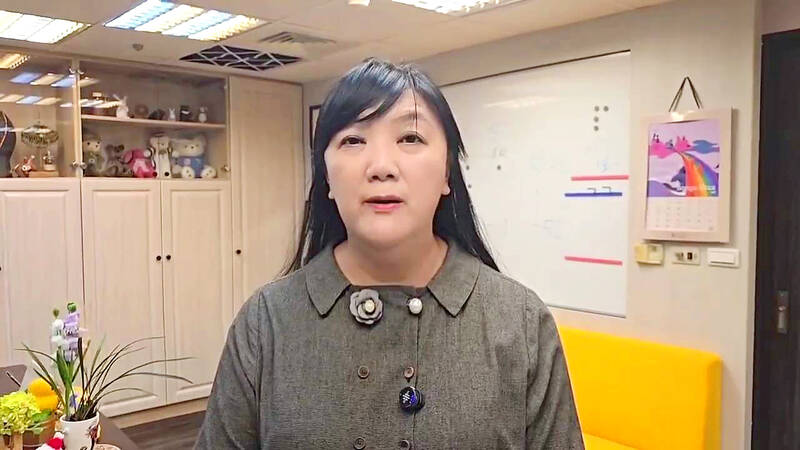Pingtung County prosecutors and judicial officers yesterday searched a local Chinese Nationalist Party (KMT) office, and summoned 11 KMT members and staff for questioning over allegations of signature fraud in a campaign to recall an indigenous Democratic Progressive Party (DPP) lawmaker.
Prosecutors and local Ministry of Justice Investigation Bureau (MJIB) officers gathered materials and evidence at the KMT chapter’s office in Pingtung County.
Among the 11 summoned for questioning were Hsiao Jung-ming (蕭榮明), chief secretary of the local KMT office, and Chang Fang-shuo (張芳碩), an aide of KMT Legislator Lu Hsien-yi (盧縣一), also known by his Rukai name Sasuyu Ruljuwan.

Photo Courtesy of Saidhai Tahovecahe’s office
Hsiao and Chang, and nine other KMT staff, are suspected of document forgery and fraud relating to the petition drive, and of contravening the Personal Data Protection Act (個人資料保護法) and the Public Officials Election and Recall Act (公職人員選舉罷免法), Pingtung County head prosecutor Hsu Yu-chuan (許育銓) said in a statement.
Lu, his aide and KMT staff are suspected of breaching recall regulations by copying names off party member lists, forging people’s signatures and other fraudulent conduct in the campaign to recall Saidhai Tahovecahe, a Rukai DPP lawmaker.
Saidhai Tahovecahe said she had filed a judicial complaint asking Pingtung prosecutors to investigate after receiving reports from indigenous friends and relatives who found the names of dead people, including family members, or their own names on the list of signatures submitted by Chang, the head of the recall campaign, although they had never signed any forms or given their consent.
Pingtung prosecutors said that among the thousands of signatures submitted for the first-stage threshold — 1 percent of the voters of mountain indigenous districts across Taiwan — they found 1,521 invalid ones, either because of errors in filling the forms or suspected forged signatures, including 202 containing names of deceased indigenous people and 140 people who do not have indigenous status.
“A young man told me that his grandfather passed away several years ago, but his name was on the submitted list. Some indigenous voters said they have never signed any recall form, but they received calls from election officers asking them to verify their signatures on the recall forms. So we requested an investigation into these illegal activities by Chang and fellow KMT members who are trying to remove me from office,” Saidhai Tahovecahe said.
“It is clear that indigenous KMT Legislator Lu was involved right from the start, as Lu had said in a TV interview in February that the head of the recall campaign against me is a legislator’s aide who obeyed instructions from party headquarters,” she said.
“Lu later changed his story several times, telling reporters in April that the head of the recall drive had solicited signatures through his personal efforts, and is not a legislator’s aide, nor related KMT,” she added.
Lu yesterday confirmed receiving a call from Chang, who said he was in Taichung and had been summoned by MJIB officers for questioning, but denied any involvement in the case.
“Chang is an assistant in my legislative office, but we believe he is innocent. He only put down his name to head the recall drive, and worked to gather forms from the public,” Lu said.
“How could he have known that the forms contained errors or that they would be declared invalid?” he asked.

The Coast Guard Administration (CGA) yesterday said it had deployed patrol vessels to expel a China Coast Guard ship and a Chinese fishing boat near Pratas Island (Dongsha Island, 東沙群島) in the South China Sea. The China Coast Guard vessel was 28 nautical miles (52km) northeast of Pratas at 6:15am on Thursday, approaching the island’s restricted waters, which extend 24 nautical miles from its shoreline, the CGA’s Dongsha-Nansha Branch said in a statement. The Tainan, a 2,000-tonne cutter, was deployed by the CGA to shadow the Chinese ship, which left the area at 2:39pm on Friday, the statement said. At 6:31pm on Friday,

The Chinese People’s Liberation Army Navy’s (PLAN) third aircraft carrier, the Fujian, would pose a steep challenge to Taiwan’s ability to defend itself against a full-scale invasion, a defense expert said yesterday. Institute of National Defense and Security Research analyst Chieh Chung (揭仲) made the comment hours after the PLAN confirmed the carrier recently passed through the Taiwan Strait to conduct “scientific research tests and training missions” in the South China Sea. China has two carriers in operation — the Liaoning and the Shandong — with the Fujian undergoing sea trials. Although the PLAN needs time to train the Fujian’s air wing and

The American Institute in Taiwan (AIT) put Taiwan in danger, Ma Ying-jeou Foundation director Hsiao Hsu-tsen (蕭旭岑) said yesterday, hours after the de facto US embassy said that Beijing had misinterpreted World War II-era documents to isolate Taiwan. The AIT’s comments harmed the Republic of China’s (ROC) national interests and contradicted a part of the “six assurances” stipulating that the US would not change its official position on Taiwan’s sovereignty, Hsiao said. The “six assurances,” which were given by then-US president Ronald Reagan to Taiwan in 1982, say that Washington would not set a date for ending arm sales to Taiwan, consult

A Taiwanese academic yesterday said that Chinese Ambassador to Denmark Wang Xuefeng (王雪峰) disrespected Denmark and Japan when he earlier this year allegedly asked Japan’s embassy to make Taiwan’s representatives leave an event in Copenhagen. The Danish-language Berlingske on Sunday reported the incident in an article with the headline “The emperor’s birthday ended in drama in Copenhagen: More conflict may be on the way between Denmark and China.” It said that on Feb. 26, the Japanese embassy in Denmark held an event for Japanese Emperor Naruhito’s birthday, with about 200 guests in attendance, including representatives from Taiwan. After addressing the Japanese hosts, Wang